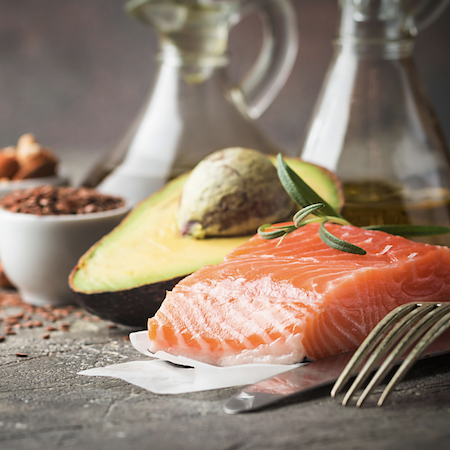Description
The body can synthesise most fatty acids from the fats contained in the food you eat. However, two essential fatty acids linoleic acid and linolenic acid, cannot be made by the body, therefore must be included in the diet. These essential fatty acids are known as omega-3 and omega-6 fatty acids and that they are necessary to build specialised fats and membranes in the body.
Omega-3 and omega-6 fatty acids are important for the normal functioning of almost all tissues in the body. Deficiencies are responsible for a range of symptoms and conditions including abnormalities in the liver, kidneys and blood, reduced height, reduced immunity, depression and skin changes including dryness and scaling (dandruff). Sufficient intake of these essential fatty acids offers numerous health benefits including the prevention of atherosclerosis, reduced risk of cardiovascular disease and stroke, and prevention of ulcerative colitis, menstrual and joint pain.
The use of supplements and additional oils are not necessary in a vegetarian diet with good sources of omega-3 and omega-6 fats. It is important to include these two fats in the diet in the correct proportion. Omega-6 fatty acids compete with omega-3 fatty acids for use in the body, therefore excessive consumption of omega-6 fatty acids can be a problem. In most dietary patterns there is a shortage of omega-3 fatty acids (e.g. from fish oil). It is necessary to restore this imbalance by following a diet containing fat that comes mainly from omega-3 fatty acids and few processed foods.
Omega-6 fatty-acids
The Omega-6 fatty acid linoleic acid, is found in leafy vegetables, seeds, nuts, grains and vegetable oils (e.g. maize, safflower, soybean, cottonseed, sesame, sunflower). Other omega-6 fatty acids, such as gamma linolenic acid (GLA), is found in blackcurrant seed, borage, evening primrose and hemp seed oils. Most diets provide sufficient quantities of omega-6 fatty acids.
Omega-3 fatty-acids
Omega-3 fatty acids should be included daily in the diet. Alpha-linolenic acid, a common omega-3 fatty acid, is found in many vegetables, beans, nuts, seeds and fruits. The best source of omega-3 fatty acids is ground flax seed and flax seed oil (50%) which contains mainly alpha-linolenic acid. For those who wish to increase their intake of omega-3 fatty acids, they can use oils such as canola (aka rapeseed) oil (10%), soy oil (7%), walnut oil (10%) and wheat germ oil ( 7%). Omega-3 fatty acids can be found in small quantities in nuts, seeds, and soy products as well as beans, vegetables and whole grains. Corn, safflower, sunflower and cottonseed oil are generally low in omega-3.
Recent research suggests that pregnant women have an increased requirement for essential fatty acids since they are necessary for foetal growth and brain development. Essential fatty acids are also important for the normal growth, development and functioning of tissues in a baby. Infants receive essential fatty acids via breast milk, so it is important for the mother’s diet contains a good supply of omega-3 fatty acids. Pregnant women and nursing mothers may also choose to take a DHA (Docosahexaenoic acid) supplement, an omega-3 fatty acid found in fish oils. Some believe that fish is a good source of essential fatty acids and fish oils have been popular to address arthritis and cardiovascular disease. However, its high fat and cholesterol content and lack of fiber make fish a less desirable choice. Also, fish must frequently be heated in order to cook it, which causes the essential fatty acids to be lost. This is because omega-3 fatty acid molecules in fish oils are extremely unstable and tend to disintegrate to form free radicals. Therefore, uncooked fish such as herring is a better choice. Research has also shown that the omega-3 fatty acids found in vegetables, fruit and beans are more stable.





